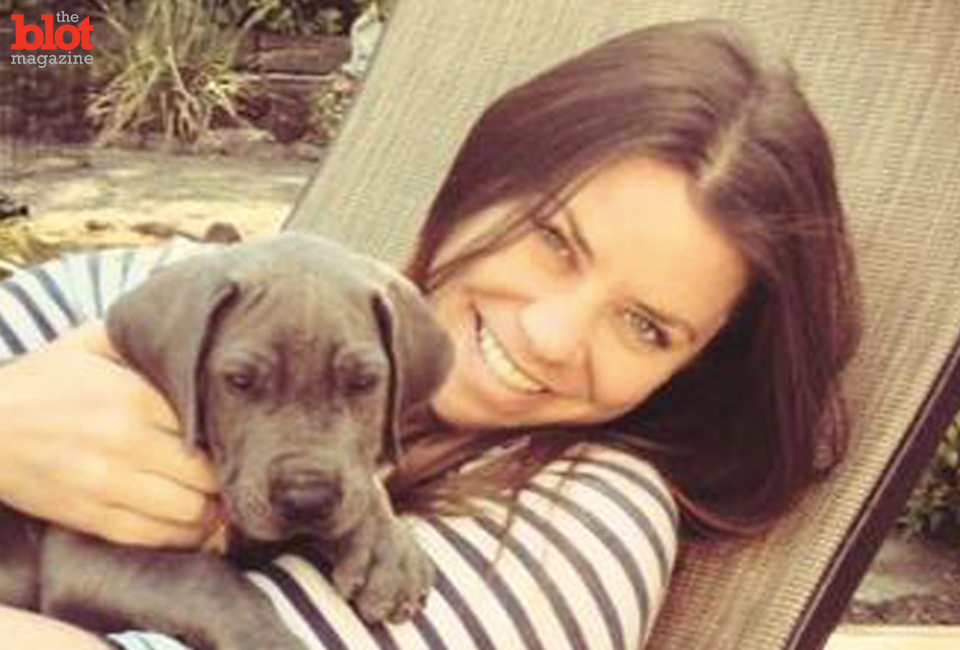
Editor’s note: This story, which originally ran on Oct. 9, has been updated following an announcement made yesterday by Brittany Maynard. See below after original text.
Brittany Maynard is a 29-year-old newlywed. She has the kind of all-American good looks that advertisers like to use to convince you to buy that kind of car or drink that kind of beer. She has a family that cares about her, and her Great Dane puppy Charlie is still small enough to be a lap dog. In short, she has her whole life ahead of her. That life will come to an end, by her choice, on Nov. 1, and I am as glad as the situation allows.
On New Years’ Day, Maynard’s doctors finally figured out why she had been suffering debilitating headaches. She had a brain tumor. Surgery to halt its growth didn’t work. In April, the medics told her that her glioblastoma, a malignant brain tumor, was stage 4 — for those of you not up on the intricacies of cancer, there is no stage 5.
The outlook was rather grim. She had about six months to live, and there was no real treatment that would help. Full brain radiation was an option. That’s not something to be taken lightly. The hair is singed off the scalp, leaving behind first-degree burns. And the tumor could still kill her if the radiation doesn’t.
Alternatively, she could let the disease take its course in hospice care. That didn’t seem very appealing either. In her own words: “But even with palliative medication, I could develop potentially morphine-resistant pain and suffer personality changes and verbal, cognitive and motor loss of virtually any kind. Because the rest of my body is young and healthy, I am likely to physically hang on for a long time even though cancer is eating my mind. I probably would have suffered in hospice care for weeks or even months. And my family would have had to watch that.”
So, the San Francisco resident packed up her family and moved to Oregon, where the law allows physician-assisted self-termination of life. Maynard says it isn’t suicide, so I’m not going to use that term. She has the prescription in her hands now. She can leave this veil of tears whenever she wants. She told the press, “I plan to celebrate my husband’s birthday on October 26 with him and our family. Unless my condition improves dramatically, I will look to pass soon thereafter … When my suffering becomes too great, I can say to all those I love, ‘I love you; come be by my side, and come say goodbye as I pass into whatever’s next.’ I will die upstairs in my bedroom with my husband, mother, stepfather and best friend by my side and pass peacefully.”
But what a bunch of nonsense that she had to go through. Although her medical condition meets the state’s requirement for this kind of death, she had to establish residence in Oregon. It was beyond inconvenient; she said, “I had to find new physicians, establish residency in Portland, search for a new home, obtain a new driver’s license, change my voter registration and enlist people to take care of our animals, and my husband, Dan, had to take a leave of absence from his job.” All because the state of California doesn’t permit people to end their own lives in this way.
I know all the arguments against physician-assisted death. The sanctity of human life (which I don’t subscribe to — the world is better without John Wayne Gacy and Ted Bundy, let alone Hitler, Stalin and Mao), the risk of depressed people opting to die (they do anyway in the thousands each year), and the danger that family will try to get granny to top herself so they can inherit her millions (such a family would find other ways to get their hands on her ducats). These arguments all pale into insignificance when you look at Brittany Maynard’s situation.
By what right does the state impose on her and her family the penalty of a painful, debilitating death? Were she one of those murderers I just mentioned, the state could not condemn her to the horrible kind of death she would be forced to endure were Oregon’s laws different. Cruel and unusual punishment is unconstitutional, but that is what she faces without the prescription.
Oh, she could take her own life without dragging a doctor into it; that is true. However, there is no guarantee she would succeed in the act. Indeed, the American Association of Suicidology (terrible term, mixing Latin and Greek like that) says only one in 25 attempts succeeds. Certainly, Maynard deserves better than a botched attempt and a life in pain thereafter (because let’s face it, we won’t let her hurt herself again, will we?).
Her dog Charlie is actually in a better legal position than she would be outside of Oregon (or the other states that permit doctor-assisted death: Washington, Montana, Vermont and New Mexico). Barring an accident, a Great Dane will usually live only six to eight years — big dogs don’t last long. And in all likelihood, he’ll get cancer of one kind or another or develop heart trouble. His owner will take him to the vet, and the vet will say, “It’s time.” There will be some tears, and then, there is the shot. And Charlie will just drift away on a barbiturate cloud.
He will not be forced to live in pain, to lose control of his bowels and muscles, to be intubated and forced to breathe, fed by an IV drip in a desperate attempt to delay the inevitable. Charlie won’t have the quality of his life sacrificed just to add a few days or weeks to it.
What the hell is wrong with this country where we treat a dying dog better than a dying human? All the Brittany Maynards deserve to be treated as well as all the Charlies. Her death sucks. Adding pain to it won’t make it any better for anyone.
The greatest human right is the right to decide one’s own fate — even unto death.
UPDATED Oct. 30, 2:59 p.m.: Brittany Maynard has decided to not die on Nov. 1 as she originally planned. After crossing off the final item on her bucket list when she and her family went to the Grand Canyon, Maynard released a video on Wednesday stating she has postponed her self-appointed date with death.
“I still feel good enough and I still have enough joy and I still laugh and smile with my family and friends enough that it doesn’t seem like the right time right now,” she said in the video.
Jeff Myhre is a contributing journalist for TheBlot Magazine.





